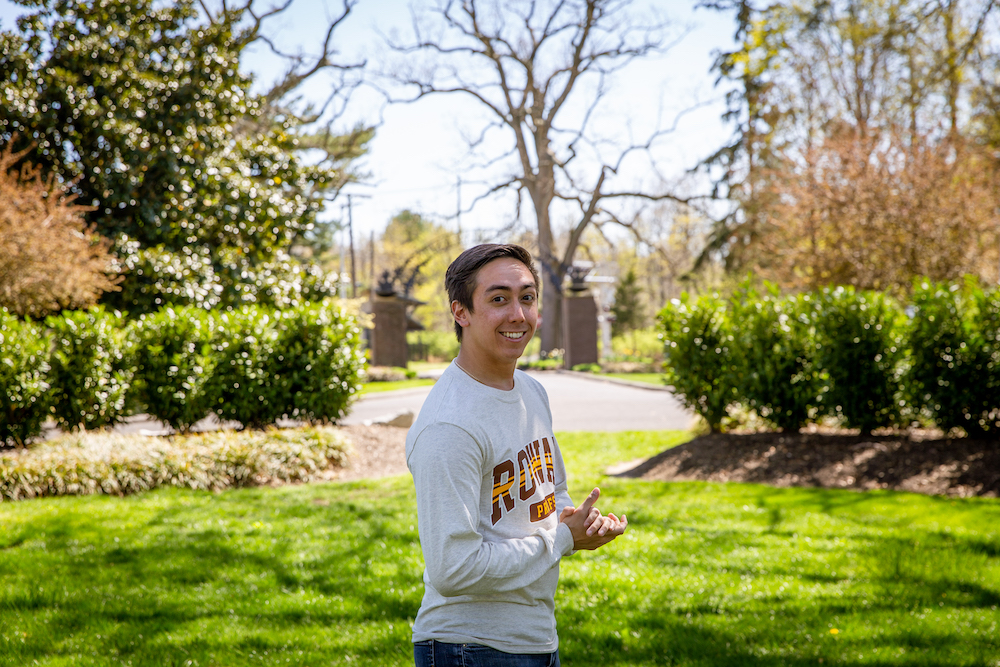Today we speak with JT Kurtz, a recent Computer Science graduate from Egg Harbor Township (Atlantic County). JT is a first-generation college student and worked as an Assistant Resident Director (ARD) on campus, most recently at 223 Nexus.
How did you like living on campus?
I loved it! I was a Resident Assistant (RA) in Chestnut Hall last year and Magnolia Hall the year before. It’s a complete 180 from working in traditional living to living in new apartments. I remember as a freshman, those apartments were not even there.
In your three years of being the go-to person as an RA and ARD, what is your advice for people who are living in dorms?
My advice is to not be afraid to make connections. Being the RA/ARD, I’m the middle person to connect people with programs or on-campus resources. We’re there for people when they ask, “Hey, what should I do?” Whether they’re stressed out, bored, or if they need help, RAs and ARDs know it all. For anybody — whether you’re new, a transfer, or have been here for two years — RAs and ARDs will always be there for you. We will definitely guide you to somebody that can help you. For me, being in that department, I have met so many of my closest friends who have helped him with making connections (from talking to people in the PR department to the admissions department).
What does being an RA mean to you?
In my eyes, the RA position isn’t so much about following the rules. I know a lot of people tend to put a label on RAs as “rule-enforcers” but that’s not the case. We’re here to make sure you’re safe and that you’re having a good time at the same time. There are rules made for a reason, not just to ruin the fun. We understand that we’re in a college atmosphere. We empathize with a lot of people.

The way we shift that empathy is by encouraging them and saying, “Hey, here’s a safer, smarter alternative way to approach something.” Whether that’s academics, [social life] or mental health. For example, if somebody’s stressed out they may not go to class. I’ll go to them and say, “Let’s get to the root of this and make a plan of action and then turn it around.” Rather than just saying, “Hey go over here” [and leave them to figure it alone]. We try to connect with them at a deeper level. We have rules, but we have them for a reason, making sure that everyone is having fun and staying safe at the same time.
What are some of your favorite memories from being an RA?
Some of my favorite memories (prior to Covid) are the times I’ve been able to hang out with all of my staff members. Whether it’s just getting food, pinging ideas off each other, or just doing homework, or duty nights and handling incidents. The big theme of this experience was that you’re never alone. Even in a virtual setting, we still managed to find ways to really be connected. Sometimes we would just hop on a Zoom call and have a conversation.
What is the difference between being an RA and an ARD?
Now, I’m like a team captain of the RAs. I had to figure out how to keep my staff engaged and doing their responsibilities. At the same time, I’m recognizing that my staff are still people at heart and still need to balance their lives. My thing is music, I made a Spotify playlist that everyone can contribute to and everyone loves it. They can see all of their diverse backgrounds. There are so many stories I can go on about being an RA.
I’ve met so many influential people, from my supervisors to staff members and my residents. My residents last year always went to me, even for the most random things. At the same time, my residents had no problem referring themselves and their friends to me. I’m there for them.

How do you handle that responsibility as a fellow undergraduate student?
I handle the responsibility of taking care of fellow students through time management, balancing classes, time for myself, and time for others. The department has so many people you can lean on, your staff or supervisors. If you don’t know what to do or if you need more time on something, communication is absolutely a pinnacle skill for this kind of role because that will help you succeed.
How did you become an RA?
In my first year, I lived in Holly Pointe. My RA at the time, Mitch McDaniels, who graduated last year, was a fantastic person. He was really engaged with the residents. He kept it down to earth. He didn’t come off as a policy enforcer but we all respected him. He inspired me.
I had personal roommate issues (I roomed with my best friend). Mitch managed to smooth it out and now my best friend and I are still best friends. From that moment, I knew that [being an RA] was a leadership position. If I could help one person a day, that makes it so worth it.
Like what you see?
Story by:
Marian Suganob, public relations and advertising graduate
Photos by:
Stephanie Batista, junior music industry major



